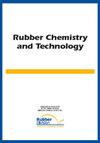SHAPE, ORIENTATION, INTERACTION, OR DISPERSION: VALORIZATION OF THE INFLUENCE FACTORS IN NATURAL RUBBER NANOCOMPOSITES
IF 1.5
4区 工程技术
Q4 POLYMER SCIENCE
引用次数: 0
Abstract
The addition of nanoparticles as reinforcing fillers in elastomers yields nanocomposites with unique property profiles, which opens the door for various new application fields. Major factors influencing the performance of nanocomposites are studied by varying the type and shape of nanoparticles and their dispersion in the natural rubber matrix. The industrial applicability of these nanocomposites is put into focus using two types of graphene and a nanoscale carbon black, all commercially available, and scalable processing techniques in the form of a highly filled masterbatch production via latex premixing by simple stirring or ultrasonically assisted dispersing with surfactant followed by conventional two-roll milling and hot pressing. Different processing and measurement methods reveal the potential for possible improvements: rheology, curing behavior, static and dynamic mechanical properties, swelling, and fire behavior. The aspect ratio of the nanoparticles and their interaction with the surrounding matrix prove to be crucial for the development of superior nanocomposites. An enhanced dispersing method enables the utilization of the improvement potential at low filler loadings (3 parts per hundred of rubber [phr]) and yields multifunctional rubber nanocomposites: two-dimensional layered particles (graphene) result in anisotropic material behavior with strong reinforcement in the in-plane direction (157% increase in the Young's modulus). The peak heat release rate in the cone calorimeter is reduced by 55% by incorporating 3 phr of few-layer graphene via an optimized dispersing process.形状、取向、相互作用或分散:天然橡胶纳米复合材料中影响因素的定价
在弹性体中添加纳米颗粒作为增强填料,产生了具有独特性能的纳米复合材料,这为各种新的应用领域打开了大门。通过改变纳米颗粒的类型和形状及其在天然橡胶基体中的分散度,研究了影响纳米复合材料性能的主要因素。使用两种类型的石墨烯和纳米级炭黑,所有这些都是市售的,并采用可扩展的加工技术,通过简单搅拌或用表面活性剂进行超声辅助分散,然后进行常规的两辊研磨和热压,通过胶乳预混制备高填充母料,从而使这些纳米复合材料的工业适用性成为焦点。不同的加工和测量方法揭示了可能的改进潜力:流变性、固化性能、静态和动态力学性能、膨胀和防火性能。纳米颗粒的长径比及其与周围基质的相互作用被证明是开发优异纳米复合材料的关键。增强的分散方法能够在低填料负载量(每百份橡胶中有3份[phr])下利用改进潜力,并产生多功能橡胶纳米复合材料:二维层状颗粒(石墨烯)导致各向异性材料行为,在平面内方向上具有强增强性(杨氏模量增加157%)。通过优化的分散工艺加入3phr的少层石墨烯,锥形量热计中的峰值热释放率降低了55%。
本文章由计算机程序翻译,如有差异,请以英文原文为准。
求助全文
约1分钟内获得全文
求助全文
来源期刊

Rubber Chemistry and Technology
工程技术-高分子科学
CiteScore
3.50
自引率
20.00%
发文量
21
审稿时长
3.6 months
期刊介绍:
The scope of RC&T covers:
-Chemistry and Properties-
Mechanics-
Materials Science-
Nanocomposites-
Biotechnology-
Rubber Recycling-
Green Technology-
Characterization and Simulation.
Published continuously since 1928, the journal provides the deepest archive of published research in the field. Rubber Chemistry & Technology is read by scientists and engineers in academia, industry and government.
 求助内容:
求助内容: 应助结果提醒方式:
应助结果提醒方式:


